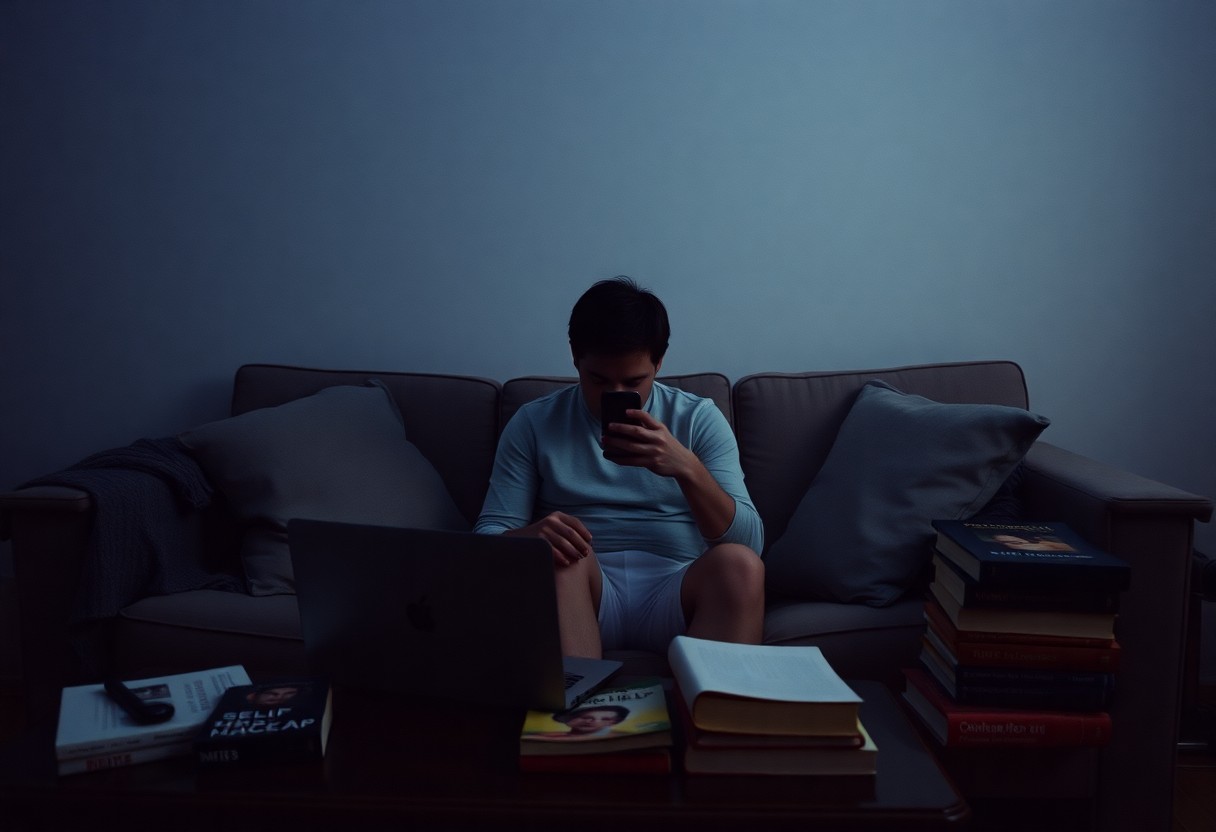You might find yourself questioning your relationship with pornography and wondering if it has become problematic in your life. Understanding the signs of porn addiction is imperative for your well-being and personal growth. In this post, we will explore eleven valuable resources that can help you assess your situation and guide you toward a healthier perspective. By recognizing the indicators of addiction and utilizing these tools, you can take proactive steps to reclaim control over your habits and improve your overall quality of life.
Key Takeaways:
- Understanding the signs of porn addiction is necessary for self-assessment.
- Consider the impact of porn on daily life, relationships, and personal responsibilities.
- Reflection on the amount of time spent consuming porn can help identify potential addiction.
- Seek resources like counseling or support groups for professional guidance.
- Self-help books and online communities can provide valuable insights and coping strategies.
- Explore tools and apps designed to track and limit porn consumption.
- Acknowledge that seeking help is a strong and positive step towards recovery.
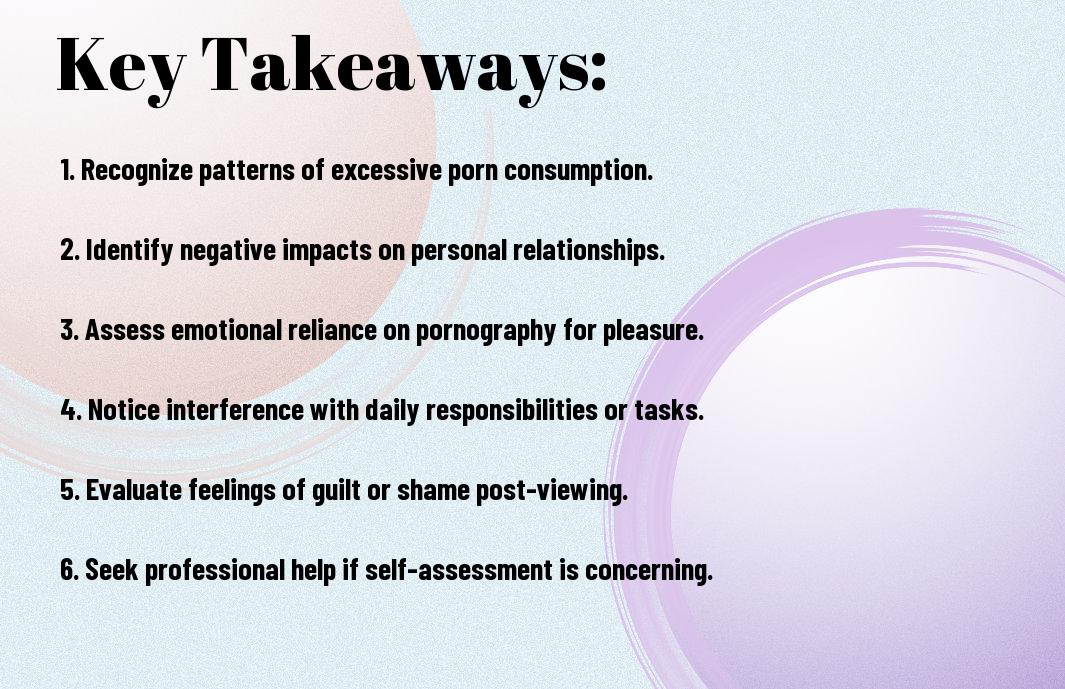
Understanding Porn Addiction
Before delving into the specifics of porn addiction, it’s necessary to understand its complexities and impact. This type of addiction can have significant effects on your relationships and personal well-being. If you’re grappling with these challenges, consider exploring I Decided to Marry a Recovering Pornography Addict to gain additional insights.
Definition of Porn Addiction
With increasing access to online content, porn addiction is defined as a compulsive behavior where individuals frequently seek out pornography, often despite negative consequences. This pattern can hinder daily functioning, relationships, and overall mental health.
Symptoms and Warning Signs
After acknowledging the definition of porn addiction, it’s important to identify its symptoms and warning signs. Common indications include loss of interest in real-life intimacy, neglecting responsibilities, and using porn as a coping mechanism for stress or anxiety.
This can manifest in various ways, such as feeling preoccupied with porn, experiencing withdrawal symptoms when unable to access it, or engaging in secrecy about your habits. Recognizing these signs can be the first step toward understanding your relationship with pornography and seeking help if needed.
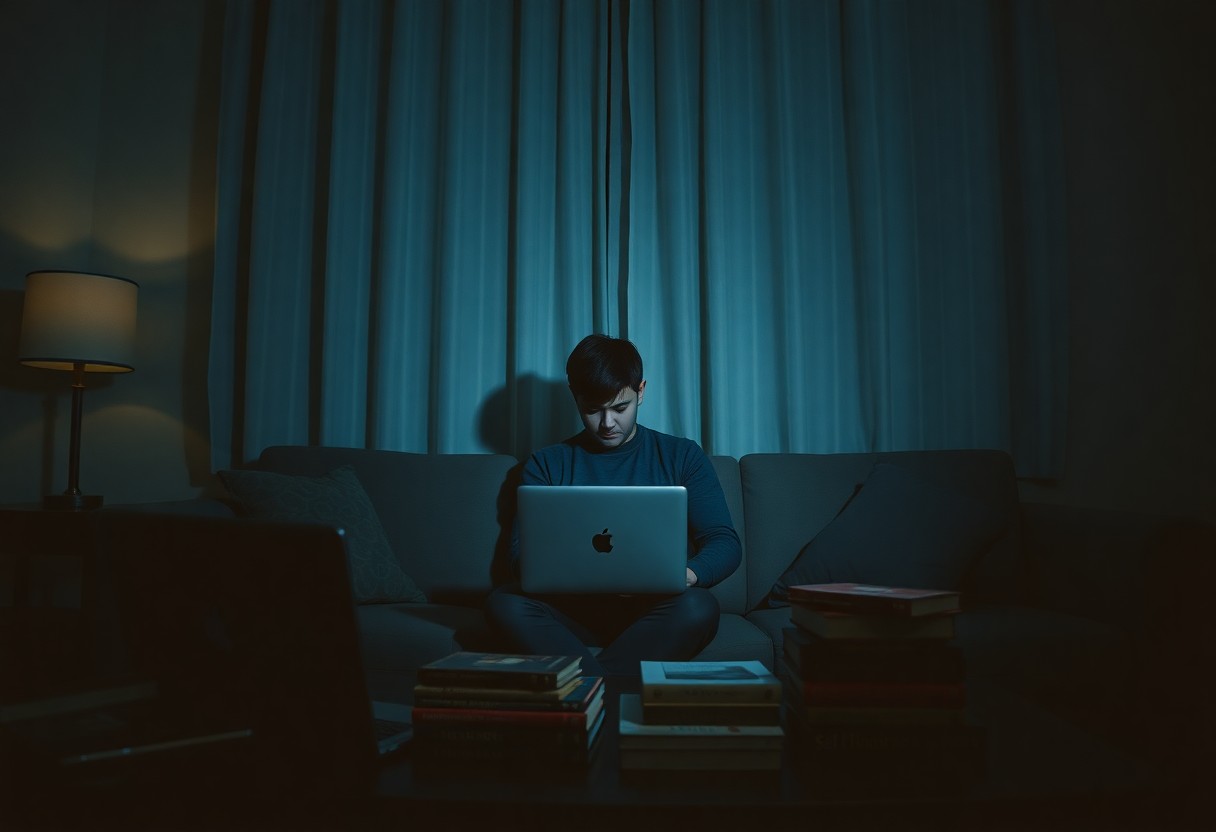
Self-Assessment Tools
Even if you suspect you may have a porn addiction, self-assessment tools can offer clarity. Various resources allow you to evaluate your habits and their impact on your life. If you feel overwhelmed, don’t hesitate to contact the National Helpline for Mental Health, Drug, Alcohol Issues for support. These self-assessment tools can be an vital first step in addressing your concerns.
Online Quizzes and Surveys
Around the internet, you can find several online quizzes and surveys designed to help you assess your relationship with pornography. These tools often consist of questions about your usage patterns, feelings, and consequences associated with your habits. By taking these assessments, you can gain insights into whether your porn consumption might be problematic.
Journaling Your Habits
By keeping a journal of your habits, you can better understand your behavior related to porn use. Documenting your triggers, feelings, and frequency can illuminate patterns you may not have noticed before. It also provides a tangible reference for your thoughts and emotions over time, making it easier to identify when your habits may be shifting toward addiction.
Tools available for journaling can vary from simple notebooks to digital apps that allow you to track your habits conveniently. You might include details such as when you view pornography, the emotions you felt afterward, and any situations that triggered your urges. This practice not only enhances self-awareness but also helps you articulate your experiences, facilitating a clearer path toward addressing any potential addiction issues.
Professional Help
For individuals struggling with porn addiction, seeking professional help can be a significant step toward recovery. Mental health professionals, such as therapists and counselors who specialize in addiction, can provide you with personalized strategies and support. Recognizing when you cannot overcome this challenge alone by pursuing therapy can be a powerful move towards regaining control of your life and well-being.
Therapy Options
Therapy can be an effective way to address porn addiction. Options such as cognitive-behavioral therapy (CBT) focus on changing the thought patterns that contribute to compulsive behavior. Working with a qualified therapist, you can explore underlying issues that may be fueling your addiction and develop healthier coping mechanisms to replace your reliance on pornography.
Support Groups and Resources
Groups available for individuals facing similar challenges can provide you with a safe space to share experiences and gain insight. Support groups often foster a sense of community, allowing you to connect with others who understand your unique struggles. These environments can help you feel less isolated and more empowered as you work through your addiction.
Also, many organizations offer additional resources, such as online forums, workshops, and reading materials aimed at supporting individuals dealing with porn addiction. Engaging with these resources can enhance your understanding of your struggles and introduce you to various coping strategies. Connecting with others through these platforms can be instrumental in your recovery journey, instilling hope and motivation as you work towards a healthier relationship with yourself and your habits.
Educational Materials
Unlike casual browsing, deepening your understanding of porn addiction through educational materials can empower you to recognize and address your behaviors effectively. Accessing informative resources, whether through books, articles, or visual content, can provide valuable insights into the psychological and societal implications of porn use, helping you navigate your relationship with it more thoughtfully.
Books and Articles
One excellent way to explore the topic of porn addiction is through books and articles dedicated to the subject. These written resources often combine personal anecdotes with scientific research, providing you with a comprehensive understanding of the impacts of pornography on mental health and relationships. Titles from experts in the field can equip you with strategies to assess your habits and consider if you might be struggling with an addiction.
Documentaries and Videos
Videos can offer a compelling look into the world of porn addiction, presenting real-life stories and expert insights in a more digestible format. Documentaries often examine the social and psychological impact of pornography, providing you with relatable experiences and clinical perspectives on addiction. They can serve as a wake-up call, prompting you to reflect on your habits and guiding you toward healthier choices.
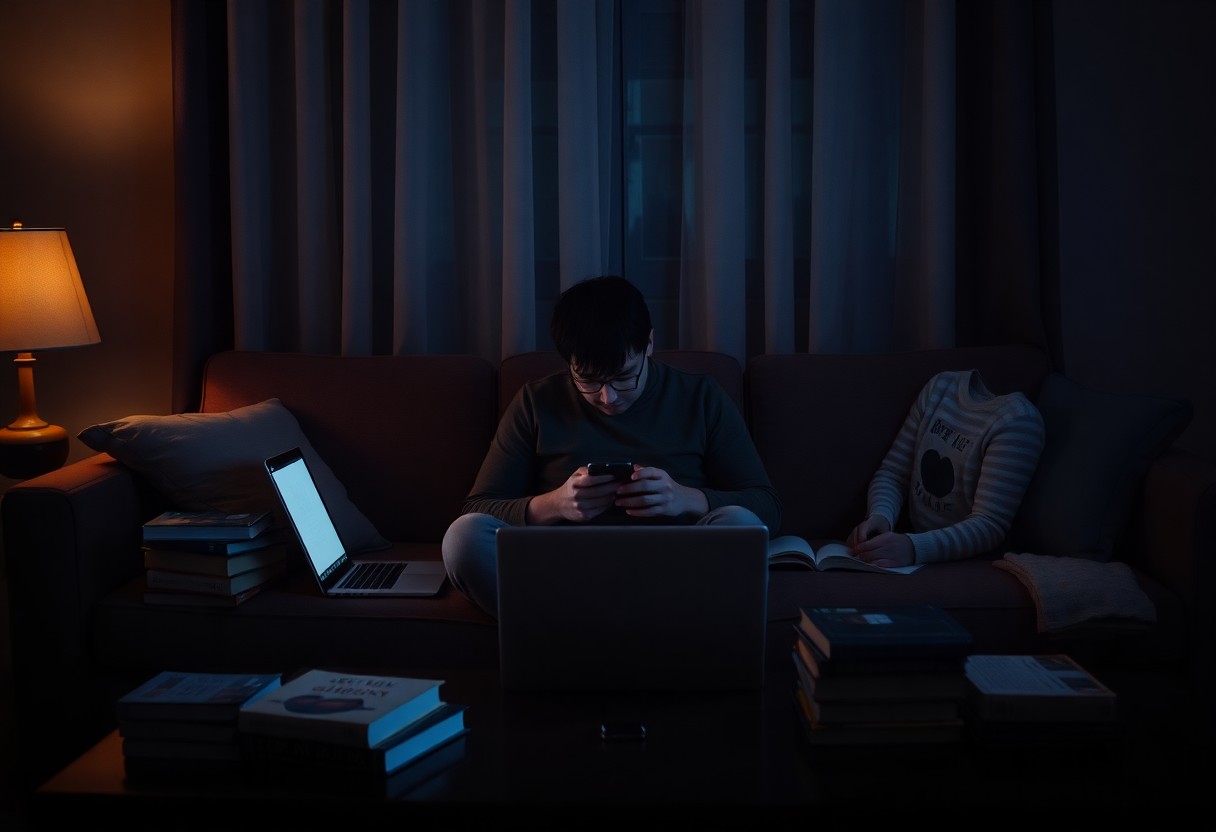
Practical Strategies for Change
Many individuals seeking to overcome porn addiction find that practical strategies can facilitate meaningful change. By implementing structured methods, you can address your habits and create a healthier relationship with yourself and your sexuality. It’s important to approach this journey with patience and self-compassion as you seek to transform your life.
Setting Boundaries
Among the most effective ways to navigate your journey toward recovery is by setting clear boundaries. Identify triggers and limit exposure to situations or materials that might lead to relapse. Establishing rules for technology use, such as screen time limits and restricting access to certain sites, can help you maintain control over your environment and foster healthier choices.
Building Healthy Habits
Change takes time and dedication, so building healthy habits is crucial for long-term recovery. Focus on incorporating activities that promote well-being, such as exercise, meditation, and hobbies that engage your mind. Surround yourself with supportive friends and family, and seek professional help if needed. By replacing negative patterns with positive routines, you can create a fulfilling life that lessens the urge to revert to old behaviors.
Boundaries not only help to manage your exposure to triggers but also empower you to cultivate new, healthier habits. As you establish these limits, consider filling your time with activities that promote personal growth and self-expression. Engaging in sports, creative projects, or social outings can redirect your focus and strengthen your resilience against temptations associated with porn. Remember that nurturing yourself holistically will support your goal of breaking free from addiction.
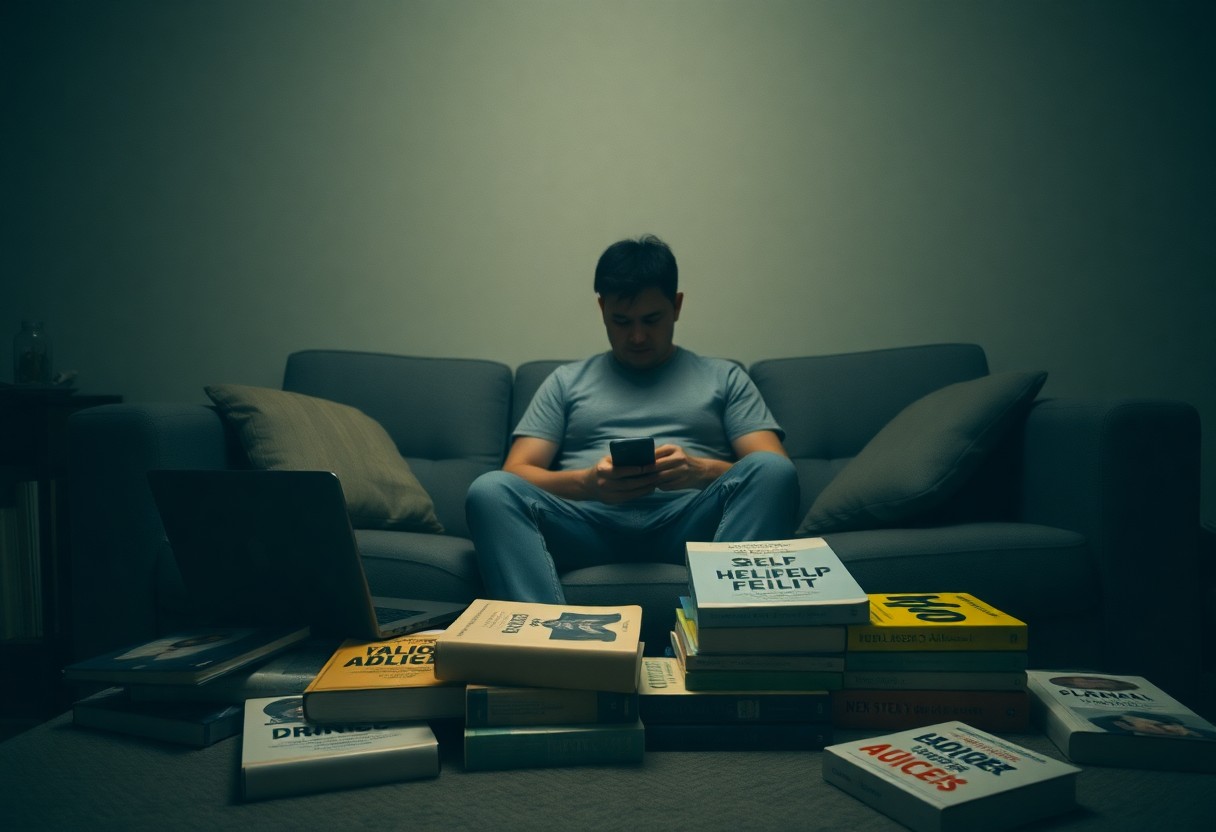
The Role of Technology
Not only does technology impact the way you consume porn, but it can also serve as a valuable tool in managing your habits. The accessibility of adult content through smartphones, tablets, and computers can contribute to addictive behaviors. Understanding the role of technology in your relationship with porn is necessary for taking control and seeking help if necessary.
Apps to Monitor Usage
Along with recognizing the impact of technology, utilizing applications to monitor your usage can provide significant insights. These apps can track the time you spend on adult sites and help you gain awareness of your habits. By simply keeping a log, you can identify patterns and triggers, enabling you to make more informed choices about your consumption.
Filters and Blockers
Role of filters and blockers becomes increasingly important as you work on managing your porn consumption. These tools can help you avoid temptation by restricting access to adult content on your devices, creating a healthier digital environment. With the installation of effective filters or blockers, you can proactively remove barriers that may lead to unwanted urges and help reinforce your commitment to change.
Apps that provide filtering capabilities can provide a personalized approach to your porn consumption journey. You can choose what to block based on your preferences and needs, ensuring your digital space aligns with your goals. Additionally, some apps offer customizable features that allow you to set time limits and receive alerts when your usage patterns change. By leveraging these tools, you empower yourself to make positive changes and maintain control over your habits.
To wrap up
With this in mind, exploring the signs of porn addiction can help you better understand your relationship with this behavior. Utilizing the 11 must-have resources provided offers you a pathway to self-assessment and potential recovery. You deserve to lead a fulfilling life free from compulsive habits, and by taking these initial steps, you’re empowering yourself to seek help and make positive changes. Trust in the process as you explore these resources, and know that seeking support is a sign of strength.
FAQ
Q: What are the signs that indicate I might have a porn addiction?
A: Some common signs include spending excessive amounts of time viewing porn, feeling unable to stop despite wanting to, neglecting responsibilities, or experiencing negative emotions such as anxiety or depression related to porn use. If you find that porn is impacting your personal relationships or daily life, it may be an indicator of a deeper issue.
Q: How can I differentiate between casual viewing and addiction?
A: Casual viewing typically does not interfere with your personal life, responsibilities, or relationships. If you notice that your porn consumption is escalating, that you seek it out compulsively, or that you prioritize it over other enjoyable activities, it may suggest an addiction.
Q: Are there specific psychological impacts associated with porn addiction?
A: Yes, individuals struggling with porn addiction may experience various psychological effects such as feelings of shame, guilt, or anxiety. It can also lead to decreased sexual satisfaction in real-life relationships, as well as a distorted view of sexuality.
Q: What resources can I use to evaluate my porn consumption?
A: There are several self-assessment tools and questionnaires available online designed to help individuals evaluate their relationship with porn. Resources such as books, articles, and support groups can also offer valuable insights and guidance on understanding and addressing porn addiction.
Q: Can porn addiction affect my physical health?
A: Yes, excessive porn consumption can lead to factors associated with physical health decline, such as erectile dysfunction or lower sex drive in real relationships, as well as potential negative impacts on one’s overall mental health, contributing to stress and isolation.
Q: What steps can I take if I believe I have a porn addiction?
A: Seek help by talking to a trusted friend or a mental health professional. You might find support groups or therapy specifically geared toward porn addiction beneficial. Additionally, setting limits on screen time, seeking healthier outlets for stress relief, and educating yourself about sexual health can be effective first steps.
Q: Is recovery from porn addiction possible, and how long does it take?
A: Yes, recovery from porn addiction is achievable, but the duration varies by individual. It often involves a commitment to changing behaviors, understanding triggers, and seeking support. Many find that they start to see improvements in emotional and relational health within a few months, but it can take longer for some individuals depending on the depth of their addiction and personal circumstances.
